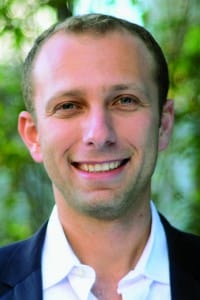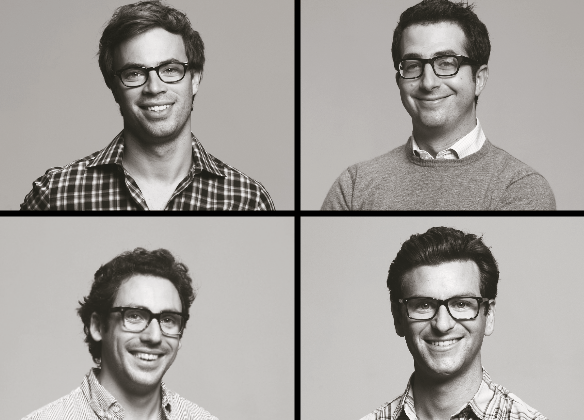Classmates. Friends. Business partners. That is the progression for a growing number of Wharton alumni as they act on an entrepreneurial vision that often has its roots in their undergrad or graduate years. According to Wharton’s MBA Career Management office, the number of students starting their own businesses at graduation more than doubled from 2010 to 2011, from 30 to 61. In 2007, the number was 13.
The alumni featured here have launched recent startups in publishing, fashion, romance, food and finance, but one unique link ties them together: the Wharton network. These new entrepreneurs, who are drawing some major media attention for their enterprises, praise their classmates, professors and fellow alumni who have generously offered advice, support, insights, connections and positivity.
The entrepreneurial vision for Neil Blumenthal, WG’10; David Gilboa, WG’10, GEN’10; Andrew Hunt, WG’10; and Jeffrey Raider, WG’10, was Warby Parker, an online eyeglass boutique that has since gained attention in national media, including the New York Times and the Financial Times.
All four co-founders had complained to each other about the high cost of eyeglasses, with Gilboa actually going half a semester without glasses because he couldn’t justify spending the money to replace a lost pair and Raider, at one point, using a paperclip to keep his in one piece, Blumenthal recounts.
Coupling that frustration with Blumenthal’s knowledge of the industry—having been involved with VisionSpring, a nonprofit that helps launch eyeglass businesses in developing countries—their concept of radically transforming the optical industry was born during their first semester at Wharton.
“A lot of the professors were incredibly helpful,” Blumenthal says, reserving special thanks for Evan Rawley, an assistant professor in the Management Department; David Bell, the Xinmei Zhang and Yongge Dai Professor in the Marketing Department; and Peter Fader, the Frances and Pei-Yuan Chia Professor and co-director of the Wharton Customer Analytics Initiative.
“We would just set up meetings and chat with folks,” Blumental says. “They helped us think through how do we think about our customers, how do we raise awareness, how do we make customers happy and increase customer lifetime value. And they continue to be helpful today, even though we have graduated.”
As the Warby Parker co-founders learned about creating a deliverable business plan and participated in a variety of entrepreneurial-focused programs and classes, they also visited factories in Asia and used their classmates as focus groups.
In the second semester of their second year, they launched the company’s website. Soon after, they were featured in Vogue and GQ, sold out of their top 15 styles in the first month and had a waiting list of 20,000 people within a few more.
Now, the company employs 50 people, has an office in midtown Manhattan and just closed a round of $12.5 million funding. And, as part of the “buy a pair, give a pair” program, the company has donated more than 125,000 pairs of eyeglasses to people in need, Blumenthal says.
“I think that the four of us feel so lucky that we had the opportunity to go to Wharton,” Blumenthal says. “There’s no question, the fact that we were able to grow so quickly was through the support of our classmates, our professors and the community in general.”
STARTUPS MADE EASIER?
Creating a startup has definitely become easier over the years, says Alex Lorton, W’06, who co-founded cater2.me with Zach Yungst, C’06, W’06, to connect chefs in the San Francisco Bay area with clients in need of catering, such as high-tech companies that provide lunch for employees.
“You can essentially start a business with a laptop,” Lorton says, “and it doesn’t often require much more than that.”
Lorton, who worked in management consulting, and Yungst, who went into investment banking after graduation, were recently featured in the New York Times, which noted the pair’s success in connecting chefs and clients.
Wharton not only teaches the hard skills, such as accounting and finance, Lorton says, but it teaches “the network and how to leverage the network,” which his company used in building a client base. “People were very responsive and helpful.”
“One thing I always tell people,” says Mike Melby, WG’10, CEO of PayDivvy in Irvine, CA, “is the biggest education at Wharton comes from your classmates, not from your classes. That doesn’t mean education doesn’t come from classes as well, but the caliber of students is so high and the backgrounds of your fellow students are so impressive and complex.”
It essentially equates to a budding entrepreneur having an entire student body filled with “free advisers to your company,” he says.
PayDivvy is an online tool that allows users to manage, organize and pay their bills in conjunction with roommates or anyone else who shares payment of expenses. It has already been featured in the Los Angeles Times, CNN Money and Mashable, among other places.
The concept grew out of Melby’s own difficulties in managing bills with his roommates while working long hours. “I wanted every single bill I pay to be paid from one solution,” he says. “I also wanted to be able to split bills and only pay my fair share.”
His idea was a 2009 Wharton Venture Award winner and 2009 Wharton Business Plan Competition finalist, as well as part of the Wharton VIP incubator program.
AN ENTREPRENEURIAL ECOSYSTEM
Such competitions are valuable, says Rohan Deuskar, WG’11, whose firm Stylitics was the Michelson Grand Prize winner of the 2011 Wharton Business Plan Competition.
“The Business Plan Competition really helped us in our thinking about market-sizing, the competitive landscape, as well as our financial model and projections,” he says. “It was also useful to have feedback from the judges.”
Stylitics, which is still in the beta phase, is a “real-time aggregator about what clothes people are buying and wearing,” Deuskar says. Individuals use the online platform to keep track of their wardrobe uses, while brands and retailers use the aggregate information to better understand customer behavior. It’s like Neilsen ratings for fashion, he says. So far, Lucky Brand Jeans and market-research firm Gilt Groupe have signed on to the concept, and media such as Inc., The Wall Street Journal and Economic Times have written about it.
Deuskar is encouraged that Wharton is “coming into its own as having an entrepreneurial ecosystem that is vibrant—that has people who are committed to entrepreneurship and are actively engaged in it.” For instance, the Wharton Entrepreneurial Club—of which he was co-president—is one of the biggest clubs on campus and growing.
The more Wharton focuses on the entrepreneurial vision, says Josh Wais, W’11, the more it will help students make the transition from imagining themselves as business owners to actually becoming them.
“The more that Wharton can help people tip over and actually help people start [enterprises], the better,” he says.
Wais has partnered with Lauren McDevitt, W’11, on WantWorthy, a fashion-based startup that was recently identified by Ad Age as one of four startups to keep an eye on. Its website allows women to browse fashion for fun, create a wish list and eventually purchase the items they desire. Wais handles the business side, while McDevitt is “the brains behind the operation,” according to Wais.
CHALLENGES AND INSPIRATIONS
Startups, says Wais, are “extremely challenging,” but he likes the freedom as well as the creativity.
“It’s not set up for you. You have to figure it out on your own,” he puts it.

Alex Furmansky, ENG’07, W’07
That’s not to say, however, that entrepreneurs shouldn’t develop a network of people who have done it before. They should, even if searching for advice doesn’t come natural to an independent entrepreneur.
“You have to be more proactive asking for advice. Some people have trouble doing that, but you will never be able to do it by yourself,” says Stephan Jacob, WG’11, G’11. He encourages budding entrepreneurs to seek out feedback and advice, because there is a lack of structure and support systems in startups.
“I think a lot of people, especially coming from the corporate world, have to appreciate that it’s very difficult and hard to be an entrepreneur—and it’s true, it’s not easy,” Jacob adds.
Jacob and Cherif Habib, WG’11, are co-founders of Kembrel, an online platform targeted to college students. It offers access to events and discounts on shopping and services.
Then again, don’t take all advice either, says Alex Furmansky, ENG’07, W’07, whose New York-based Sparkology online dating site is geared to an elite audience of young professionals. As he transformed his concept into something tangible, Furmansky sought advice from those knowledgeable about the industry.
He learned that some individuals give positive feedback, others negative. You have to look at their biases and outlooks before acting on advice, he says.
Besides seeking advice, another preoccupation with would-be entrepreneurs is funding, though it doesn’t have to be. Jacob believes that, particularly with Internet-related startups, entrepreneurs have many ways to get started without much cash—one way being to simply build a small prototype, have people use it and get feedback that way.
Such power and freedom from rapidly developing technologies has inspired some of Wharton’s graduates.
It prompted Jon Feldman, WG’10, to focus on his current venture, the for-tablets-only Open Air Publishing. Speakeasy Cocktails, the first of Open Air’s several planned books, received kudos from The Wall Street Journal, New York Times and Gizmodo.
Feldman’s first hire was Alison Go, WG’11, who says about her experience: “You learn more in two to three months as an entrepreneur than two to three years in a consulting gig.”
Fair Observer, an online platform for global insights and analysis, is another Wharton online startup. Atul Singh, WG’10, launched it in June 2011 with co-founder and former classmate through the Wharton-INSEAD partnership, Fabian Neuen, because he wanted to be a “visionary,” not a “functionary” working for someone else. The site already has more than 200 contributors from more than 30 countries.
“Entrepreneurship is a leap of faith,” Singh says. “You must make sure you have faith in yourself and can retain it even in your direst hours, despite all of the challenges. … It’s inspiring, and it’s something that keeps us going despite the loss of hair and muscle.”

























